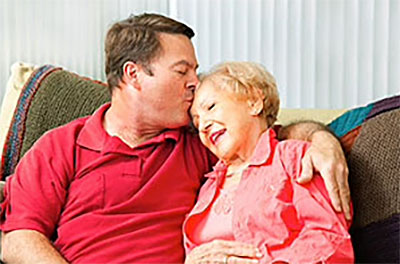Caregiving Articles with Tips and Recommendations
Five Tips for Finding a Quality Home Care Provider
You and your family have decided that it is time to bring in outside help to assist with the care of a loved one in need. Because you want them to be able to remain safe, comfortable and independent in their own home for as long as possible, you have chosen to hire an in-home caregiver or home healthcare agency.
7 Ways To Talk To Your Parents About Getting Help At Home
It can be difficult to acknowledge the fact that your parent needs some help with day-to-day activities, let alone introducing to them the idea of hiring a professional caregiver for help. Your parent is likely to react to this decision with some resistance.
A New Paradigm of Caregiving
Caretaking is fraught with many myths, assumptions and beliefs that have prevented generations of caregivers from understanding that caregiving is a rite of passage. Rites of passage define a sense of self in relation to society, paving the way for life transitions and allowing a more meaningful and clear incorporation of both familial and public roles. Seeing a family member through a health crisis marks the beginning of yet another transition for both the caretaker and the receiver and helps to define new roles and responsibilities in each of their lives. Although caretaking can help younger caregivers understand their place in the world, most view it with dread: an emotional roller coaster in which a plethora of daunting practical issues must also be addressed. These issues include the needs of spouses and children, estate and legal matters, health insurance, medications, funeral arrangements, and, in many cases, conflicts with siblings about how best to care for Mom or Dad and how to apportion responsibility, financial and personal, for their care.
Role Reversal: Adjusting To Caring For Your Parents
Learn how to first come to terms with the idea of role reversal, as you become the parents to your parents.

A Guide to Caring for Aging Parents
When caring for your aging parents, there are many things to consider from expenses of basic necessities to legal documentation and financial planning for the future. Below we will discuss what is needed to get started as a caregiver, & which things to tackle first.
How to Stock Your Caregiving Closet
Providing for Grandchildren In Your Will or Estate Plan
The prevailing rationale is that the grandchildren will be taken care of by their parents, but here’s how you might recognize grandchildren in your will .
Put it in Writing! Three Legal Documents Your Parents Must Have
If you are able, take the time before your parents need help and while they are still functioning comfortably to ask about the "big" things. Solicit their preferences for managing financial matters or real property. Find out what treatment efforts, such as resuscitation and life support, they want and expect in the event they become incapacitated.
Guardianship Versus Conservatorship – What Is the Difference?
Due to the inexorable deterioration of the cognitive faculties of a person with dementia, there is a progressive inability to carry out the various activities of everyday life. There may come a time in the course of the disease when decisions such as living arrangements (independently, with relatives, assisted living or nursing care), medical treatment, financial affairs, and personal care can no longer be handled by the patient with dementia or Alzheimer's. In these situations, someone must shoulder responsibility for managing that person’s affairs.
When is Guardianship Appropriate?
In certain cases, mental functions decline extensively with advancing age. The reasons for this progressive degradation vary with the individual, but dementia, sparked by conditions such as Alzheimer’s disease, diseased blood vessels in the brain, and Parkinson’s disease, is a leading cause.
Peripheral Edema: What You Should Know About Swollen Legs
The most common place to see edema, or swelling, is in your feet, ankles and lower legs. Edema is the result of fluid building up in your body. It can happen in any part of your body, but because of the effects of gravity, the fluid usually shows up as painless swelling in your lower extremities.
Bridging the Generation Gap
Communication between younger and older generations is the key to successfully encouraging children to connect with their elders.
